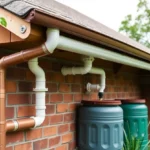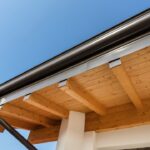The question of how long does a metal roof last often arises among homeowners investing in roofing solutions. Metal roofs have become popular for their durability and aesthetic appeal. Understandably, their longevity is a critical consideration for anyone looking to make the right roofing choice.
In this article, we explore the lifespan of metal roofs, the factors affecting their longevity, and why they might be a tremendous option for your home.

Introduction to Metal Roof Longevity
Metal roofing boasts an impressive lifespan compared to other roofing materials. Typically, metal roofs can last anywhere from 40 to 70 years, or even longer with proper maintenance. This longevity makes them a desirable choice for both residential and commercial properties.
Types of Metal Roofs and Their Durability
Aluminum Roofs
Aluminum roofs are lightweight and resistant to corrosion. This material is ideal for coastal regions where saltwater can cause rapid deterioration of other roofing types.
Steel Roofs
Steel roofs, often galvanized or coated with zinc, offer solid protection and durability. With a lifespan ranging from 50 to 70 years, steel is a cost-effective and robust option.
Copper Roofs
Copper roofs are known for their beauty and exceptional lifespan. While more expensive, copper roofs can last more than 70 years and develop a patina that adds character.
Factors Affecting the Lifespan of a Metal Roof
Quality of Installation
Proper installation is crucial. A poorly installed metal roof can lead to leaks and premature wear. It is crucial to hire skilled professionals found on sites like Rated People.
Maintenance Practices
Regular maintenance and inspections can significantly extend the lifespan of your metal roof. Removing debris and repairing damage quickly helps maintain its integrity.
Environmental Conditions
Extreme weather can impact a metal roof’s lifespan. Protection against wind, rain, and snow are vital to maintaining its longevity.
Advantages of Choosing a Metal Roof
Environmentally Friendly
Metal roofs are often made from recycled materials and can be recycled at the end of their lifespan, making them an eco-friendly choice.
Energy Efficiency
Metal roofs reflect solar heat effectively, helping to reduce cooling costs in hot climates. They also offer excellent insulation in colder climates.
Comparing Metal Roofs to Other Roofing Options
For a detailed comparison with other roofing materials, check out Best Option.
Choosing the Right Metal Roof for Your Home
Make your selection based on your budget, style preferences, and regional climate. For guidance, visit Roof Choice.
Common Misconceptions About Metal Roofs
Rust Concerns
Modern metal roofs come with coatings that prevent rust, providing peace of mind regarding durability.
Noise Levels
Contrary to popular belief, proper insulation beneath a metal roof ensures minimal noise from rain and hail.
Conclusion
In conclusion, a metal roof is a tremendous investment for those looking for longevity and minimal maintenance. By understanding the key factors and making informed choices, you can enjoy the benefits of a well-installed metal roof for decades.

FAQs about Metal Roof Lifespan
How can I make my metal roof last longer?
Regular maintenance and prompt repairs are essential. Use professional services for inspections and necessary fixes.
Are metal roofs cost-effective in the long run?
Yes, despite higher initial costs, their longevity and efficiency make them cost-effective over time. See more about TPO Roofing.
Do metal roofs enhance home value?
They can increase your homes value due to their durability, energy efficiency, and aesthetic appeal.
This article contains affiliate links. We may earn a commission at no extra cost to you.








